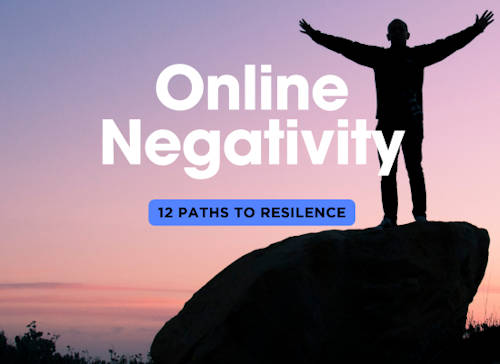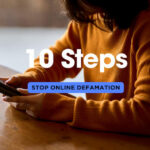In today’s digital age, online attacks can happen to anyone—whether you’re a business owner, a public figure, or just someone sharing your thoughts on social media. These attacks can be relentless, anonymous, and deeply hurtful. The emotional toll of being targeted by online harassment or criticism can leave you feeling anxious, helpless, and overwhelmed. But while you can’t always control what others say, you can control how you respond emotionally. In this guide, we’ll explore practical tips for emotionally dealing with online attacks so you can protect your mental health and maintain your peace of mind, even in the face of negativity.
1. Pause Before You React 🛑
When facing an online attack, your first instinct might be to respond quickly, defend yourself, or even retaliate. But reacting in the heat of the moment can escalate the situation and leave you feeling worse. Instead, pause and take time to process what’s being said. Give yourself space to reflect on the situation before responding—or deciding not to respond at all.
- Why It’s Important: Taking a step back helps you regain control over your emotions and prevents you from saying or doing something you might regret later.
- Action Tip: Wait at least 24 hours before engaging with harmful comments or posts. This cooling-off period can bring clarity and perspective.
2. Separate Yourself from the Comments ✂️
Remember, online attacks are often more about the attacker than they are about you. People who lash out online are frequently driven by their own insecurities, frustrations, or desire to provoke a reaction. Remind yourself that these comments do not define who you are or your worth.
- Why It’s Important: By emotionally distancing yourself from the negative remarks, you can reduce the impact they have on your mental well-being.
- Action Tip: Practice saying to yourself, “This comment is a reflection of them, not me,” whenever you come across something hurtful.
3. Lean on Your Support Network 👥
Don’t suffer in silence. When you’re feeling attacked online, it’s important to reach out to people who care about you. Share what you’re going through with trusted friends, family, or colleagues. They can provide perspective, offer emotional support, and remind you of your true value.
- Why It’s Important: Talking about your feelings can help you process the experience and reduce the isolation that online attacks can create. A strong support system can give you the reassurance you need during tough times.
- Action Tip: Call or message someone in your support network to vent and get their perspective on the situation.
4. Practice Self-Care 🌿
Online attacks can leave you feeling drained, stressed, and anxious. Taking care of your emotional and physical well-being during this time is crucial. Engage in activities that relax and restore you—whether it’s taking a walk, meditating, reading, or spending time with loved ones.
- Why It’s Important: Self-care helps you recharge emotionally and gives you the strength to face challenges with a clear mind and calm demeanor.
- Action Tip: Set aside time each day for activities that help you relax and unwind, especially if the online negativity is ongoing.
5. Limit Your Exposure 🚪
When online attacks become overwhelming, it’s essential to limit your exposure to the negativity. Constantly checking comments or revisiting hurtful posts can intensify your emotional response and prolong your distress. Take control of your online environment by muting, blocking, or unfollowing people or platforms that are contributing to the negativity.
- Why It’s Important: Reducing your exposure to harmful content helps protect your mental health and gives you the space to heal emotionally.
- Action Tip: Mute notifications for certain apps or take a temporary break from social media to give yourself a mental detox.
6. Reframe Your Mindset 🧠
It’s easy to focus solely on the negative comments, but try to reframe the situation by shifting your mindset. Instead of letting the criticism dominate your thoughts, focus on the positive aspects of your life and what’s going well. Remind yourself that you have control over how you perceive and react to the situation.
- Why It’s Important: Reframing your mindset allows you to regain power over your emotions and prevent the negativity from consuming your thoughts.
- Action Tip: For every negative comment you read, counterbalance it by writing down two positive things about yourself or your work.
7. Take Constructive Criticism to Heart, Ignore the Rest 🎯
Not all online feedback is inherently harmful—sometimes, amid the noise, there might be valid criticism that can help you grow. Learn to distinguish between constructive criticism and baseless attacks. If the comment offers something valuable that can help you improve, take it on board. If not, dismiss it without letting it affect you.
- Why It’s Important: Separating useful feedback from mindless negativity can help you grow while keeping you emotionally resilient against pointless attacks.
- Action Tip: Ask yourself: “Is this feedback helpful or just hurtful?” If it’s not helpful, let it go.
8. Focus on What You Can Control 🔧
You can’t control what people say online, but you can control how you respond to it. Direct your energy toward things that you can influence, such as improving your skills, focusing on your goals, or strengthening your relationships. Shift your attention to positive, productive activities that make you feel empowered.
- Why It’s Important: Focusing on what you can control helps you avoid feeling powerless and gives you a sense of agency during tough times.
- Action Tip: Create a list of things you can actively work on to improve your personal or professional life, and channel your energy into those areas.
9. Know When to Walk Away 🚶♀️
Sometimes, the best response to an online attack is no response at all. Engaging with trolls or negative commenters can often escalate the situation, giving them the attention they seek. Know when to walk away from the discussion and focus on protecting your peace. Not every comment requires your attention or response.
- Why It’s Important: Walking away helps you maintain emotional control and prevents unnecessary stress. It also signals to others that you are above the negativity and won’t be dragged into fruitless arguments.
- Action Tip: Set a personal boundary—if engaging in the conversation isn’t productive after a few exchanges, disengage completely.
10. Consider Professional Help if Needed 🛋️
If online attacks are affecting your mental health significantly, don’t hesitate to seek professional help. Talking to a therapist or counselor can provide you with strategies to cope with emotional distress, anxiety, or feelings of helplessness caused by online harassment.
- Why It’s Important: A mental health professional can help you process your emotions and develop healthy coping mechanisms to deal with stress and negativity. They can also help you regain confidence and resilience.
- Action Tip: Research local or online therapy options, especially those who specialize in digital or social media-related stress, and don’t hesitate to schedule an appointment if you need additional support.
11. Focus on Your Purpose 🎯
During online attacks, it’s easy to lose sight of why you started your journey in the first place—whether it’s running a business, sharing your opinions, or pursuing your passion. Reconnect with your purpose and remind yourself why you’re doing what you’re doing. Focusing on your goals and mission can help you stay grounded and prevent the negativity from derailing your progress.
- Why It’s Important: Reconnecting with your core purpose helps you maintain perspective, ensuring that the attacks don’t define or distract you from your long-term vision.
- Action Tip: Take time to revisit your goals or passions and channel your energy into activities that align with your mission.
12. Celebrate Your Strength 🏅
Dealing with online attacks can be incredibly tough, and each time you navigate a difficult situation, you build emotional strength. Recognize and celebrate your resilience—the fact that you’re learning to handle adversity and come out stronger. Every step you take to rise above the negativity is a victory worth acknowledging.
- Why It’s Important: Celebrating your strength helps you build confidence and reminds you of your capacity to overcome challenges. This mindset reinforces positivity, even in difficult times.
- Action Tip: Acknowledge your wins, no matter how small. Give yourself credit for handling the situation with grace and strength.
Online attacks can feel overwhelming and deeply personal, but how you respond can make all the difference. By following these steps, you’ll not only protect your mental health but also build emotional resilience that will serve you in the long run. Remember, you are in control of your emotions, and no online comment can define your worth or undermine your goals. Whether it’s stepping away, leaning on your support system, or reframing your mindset, each action you take empowers you to rise above the negativity and stay focused on what truly matters. Stay strong, stay grounded, and continue moving forward with confidence.



